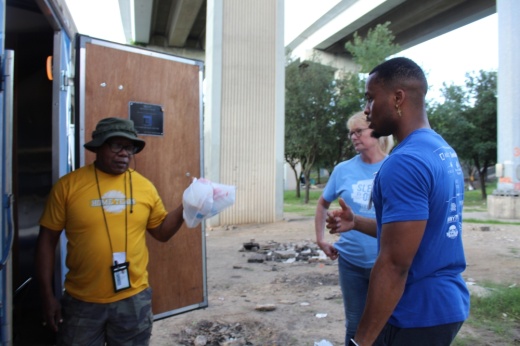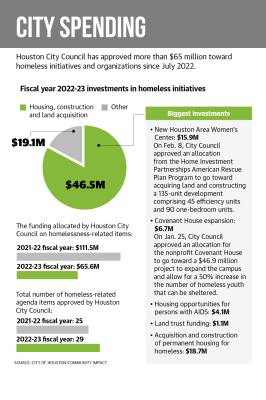Walker, whose other interests include drawing semi-realistic portraits and cooking seafood dishes, was one of a dozen or so Covenant House residents to take part in the Broadway show, a new fundraiser for the nonprofit to support its mission of helping homeless youth ages 18-24.
Two months earlier, Walker did not have stable housing. In the short amount of time she has stayed at Covenant House, which provides shelter and support services, a lot in her life has changed, she said. With help from the nonprofit’s counselors, she is looking at re-enrolling in college with an eye on nursing.
“It makes me feel like there is hope,” Walker said of the support she’s gotten from Covenant House. “I feel like I can use my story ... to inform other youth that need help also.”
Covenant House is one of more than 60 nonprofits that collaborate as part of The Way Home initiative in Houston, a city-backed effort to eliminate homelessness. Walker’s personal story, which involved staying in 33 different foster homes going back to age 2, demonstrates why supporting homeless people is such a worthwhile endeavor, Covenant House Executive Director Leslie Bourne said.
The number of unsheltered people experiencing homelessness in Harris County dropped by just over 17% in the past year, continuing an ongoing trend that has seen a nearly 63% decline in overall homelessness in the county since 2011.
The latest numbers, released May 3, were celebrated by city and nonprofit leaders in Houston as payoff for more than a decade of effort and financial investments into initiatives to reduce homelessness. Having housed more than 28,000 homeless people since 2011, The Way Home has helped Houston emerge as a national leader in the conversation on how to keep people off the streets, Houston Mayor Sylvester Turner said.
“Reducing [unsheltered] homelessness by 17% in one year and nearly 40% since coming into office [in 2016], does not happen by mistake,” Turner said in public remarks made May 3. “Rather, it’s the result of making it a top priority, enhancing our invaluable partnership with Harris County and the community, and strategically funding data-proven, holistic housing solutions.”
However, rising eviction filings in Harris County coupled with an increase in the overall number of homeless people in each of the past two years—driven by an increase in those residing in shelters—has some officials in the nonprofit sector focusing on providing people with the support they need beyond a roof over their heads.
Declining unsheltered population
The 2023 point-in-time count took place from Jan. 25-27 in Harris, Montgomery and Fort Bend counties, and results were released May 3. The count is conducted each year by the Coalition for the Homeless of Houston/Harris County and involves conducting face-to-face interviews with people experiencing homelessness.
In total, 1,186 people were considered unsheltered in 2023 in Harris County, a decrease from 1,430 people in 2022.
This can include people living on the streets, cars, parks or abandoned buildings.
The success the city made in combating unsheltered homelessness did not come as a surprise to Alex Loving, CEO of SEARCH Homeless Services, a Houston-based nonprofit that works with people at all stages of the homeless experience, including outreach and housing navigation.
"The decrease in the unsheltered count wasn't that surprising to us because we put so much resource into it," she said. "Seeing those numbers to me was validating. I see it every month in how many people we house, but to see it happen on a more global scale, that felt right."
However, the number of homeless people in the county has increased in each of the past two years. A total of 1,803 people in the county were staying in shelters in 2023, an increase of just under 15% from 1,534 people in 2022.
“Although Houston is showing the state and nation how to reduce street homelessness and encampments successfully, the job is not done,” Turner said. “We must do more.”
Roughly 42% of unsheltered individuals surveyed said they were experiencing homelessness for the first time, an increase from 40% in 2022. Meanwhile, 33% cited an economic impact, such as job loss, as the primary cause of their homelessness.
Eviction filings are also increasing in Harris County, according to data from the Eviction Lab at Princeton University.
A federal moratorium on evictions was put in place during the coronavirus pandemic, prohibiting people from being evicted from their homes, but protections expired in July 2021.
According to Eviction Lab data based on courtroom filings in Harris County, the number of evictions filed in each month from May 2022-April 2023 was higher than the average filings for each of those months when using data from 2012-15 as a benchmark.
Bourne said a key component moving forward involves helping people not just find housing but find ways to become independent. To that end, Covenant House is bolstering its support services, including helping people deal with mental health, substance abuse, career services and gaps in education, she said.
“We’re that safety net for them so they become stable enough to find the right job ... they feel they can be good at,” she said. “We don’t want it to be a vicious cycle where they become a chronically homeless adult.”
Although Houston operates on a housing-first model, Loving said it is crucial to follow up with people as well.
"People need the support and the care to transition from the streets to being sheltered," she said. "You give someone a roof over their head, and that's really where it starts. That's where you are able to start helping people focus on the changes that they want to make."
City investments
The city of Houston has continued to invest in initiatives to reduce homelessness. A Community Impact analysis of agenda items approved by Houston City Council in fiscal year 2022-23 showed more than $65 million was approved for items that ranged from rapid rehousing initiatives, homeless case management services and affordable housing targeting homeless individuals.
Before his final day in office in January 2024, Turner remains focused on continuing partnerships to reduce the number of homeless individuals and create more affordable housing, said Marc Eichenbaum, special assistant to Turner on homeless initiatives, in an emailed statement.
“Shelters play an important role as the front door to our housing system, but unlike other jurisdictions, we have moved away from primarily being a shelter-based system to being a housing based response system to break the cycle of homelessness,” he said.
Loving said moving forward it will be crucial for the city and the broader Houston community need to keep focused on both homelessness and affordable housing as a mayoral transition takes place following elections this November.
"What we're seeing at SEARCH is we're having an incredibly difficult time finding landlords and properties that will accept our clients ... and then will accept the subsidies," she said. "There's a shortage of one-bedroom affordable units. That is the biggest challenge."
The progress made so far shouldn’t be overlooked, Bourne said. Changes have occurred in how homeless individuals are viewed just in the past decade, she said, with people becoming more understanding.
“Back in the day ... it was more of [people] looking down on them,” Bourne said. “When you hear their stories, you can see they are the strong ones. They survived and made it here.”







